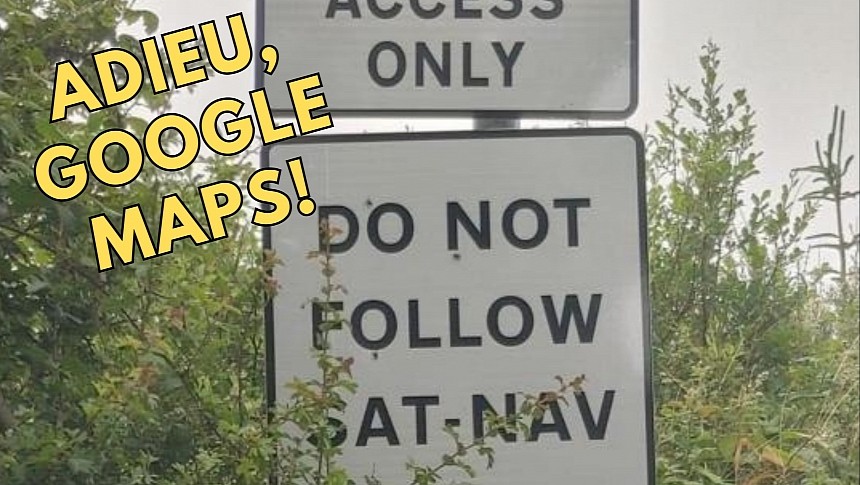Navigation apps, such as Google Maps and Waze, have millions of daily users, as they've become convenient ways to find a destination and get turn-by-turn guidance to it more straightforward.
On the other hand, many people misuse these apps. They trust their directions blindly, without acknowledging that the smallest error could send them to the middle of nowhere, sometimes without a cellular signal.
Authorities in Clare County Council (Ireland) have decided to erect a new road sign on the Wild Atlantic Way specifically to tell drivers to stop using navigation apps. "Do not follow sat-nav," the sign reads. It's placed right under a "local access only" sign.
The approach is unusual, but it makes perfect sense. Navigation apps typically look for shortcuts to guide drivers to their destinations, sometimes using small, residential roads in the suggested routes. As a result, navigation apps create massive disruptions in small communities, eventually sending heavy traffic on roads incapable of handling it.
The same has happened in Clare County, as drivers following sat-nav solutions end up on private property or hit a dead-end by not paying enough attention to road signs. On the other hand, people in the region claim the road signage isn't clear enough and sometimes is missing altogether, making it impossible for drivers to find their destinations.
Eventually, drivers switch to navigation apps as the final alternative, relying on their turn-by-turn guidance for directions to an unfamiliar address.
Authorities have been criticizing navigation apps for sending traffic to residential roads for many years, in some cases working together with the parent companies to optimize their routes for using the main streets in their routes. However, such an approach defeats the purpose of navigation apps, as their goal is to help drivers find the fastest route to a defined destination.
Waze is living proof. The application bundles a crowdsourcing engine that allows users to report traffic incidents, including accidents, traffic jams, speed traps, potholes, and broken traffic lights. Using this information, the application looks for faster routes, eventually helping drivers avoid any point potentially causing a slowdown. As a result, it uses the entire road network to find quicker routes, including secondary streets, sometimes sending drivers to quiet neighborhoods where heavy traffic causes major problems.
So far, Google, Apple, and other companies have ignored the problem, so authorities erecting dedicated signs to tell drivers to ditch navigation apps is more or less a desperate solution. Despite this effort, I seriously doubt drivers will give up on their software companions behind the wheel, but having another sign to recommend against using sat-nav in certain regions highlights a modern problem the world can't deal with. Not without tech giants stepping in and updating their routing engines, at least.
Authorities in Clare County Council (Ireland) have decided to erect a new road sign on the Wild Atlantic Way specifically to tell drivers to stop using navigation apps. "Do not follow sat-nav," the sign reads. It's placed right under a "local access only" sign.
The approach is unusual, but it makes perfect sense. Navigation apps typically look for shortcuts to guide drivers to their destinations, sometimes using small, residential roads in the suggested routes. As a result, navigation apps create massive disruptions in small communities, eventually sending heavy traffic on roads incapable of handling it.
The same has happened in Clare County, as drivers following sat-nav solutions end up on private property or hit a dead-end by not paying enough attention to road signs. On the other hand, people in the region claim the road signage isn't clear enough and sometimes is missing altogether, making it impossible for drivers to find their destinations.
Eventually, drivers switch to navigation apps as the final alternative, relying on their turn-by-turn guidance for directions to an unfamiliar address.
Authorities have been criticizing navigation apps for sending traffic to residential roads for many years, in some cases working together with the parent companies to optimize their routes for using the main streets in their routes. However, such an approach defeats the purpose of navigation apps, as their goal is to help drivers find the fastest route to a defined destination.
Waze is living proof. The application bundles a crowdsourcing engine that allows users to report traffic incidents, including accidents, traffic jams, speed traps, potholes, and broken traffic lights. Using this information, the application looks for faster routes, eventually helping drivers avoid any point potentially causing a slowdown. As a result, it uses the entire road network to find quicker routes, including secondary streets, sometimes sending drivers to quiet neighborhoods where heavy traffic causes major problems.
So far, Google, Apple, and other companies have ignored the problem, so authorities erecting dedicated signs to tell drivers to ditch navigation apps is more or less a desperate solution. Despite this effort, I seriously doubt drivers will give up on their software companions behind the wheel, but having another sign to recommend against using sat-nav in certain regions highlights a modern problem the world can't deal with. Not without tech giants stepping in and updating their routing engines, at least.






